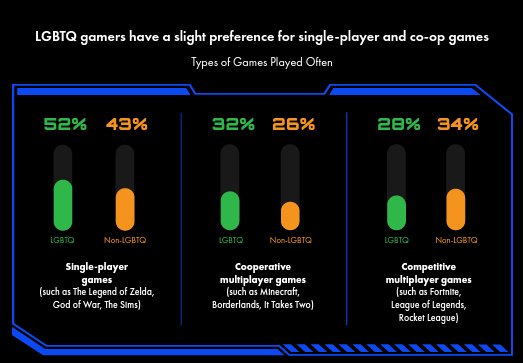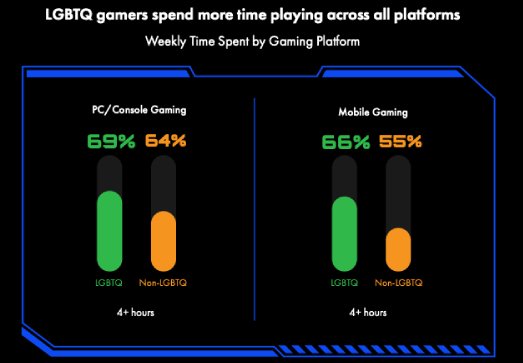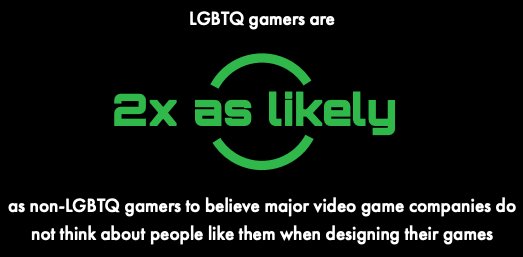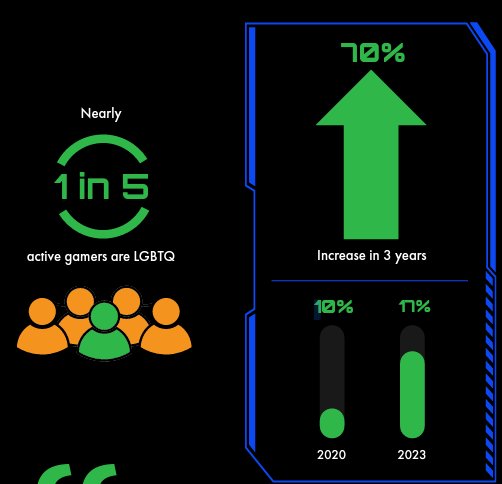A few days ago, GLAAD, a non-profit organization advocating for inclusion and representation for lesbian, gay, bisexual, transgender, and queer people, released their first annual report on the "quantity, quality and diversity" of such characters in video games. This also included research into LGBTQ gamers themselves and what they want to see from their games and the creators behind them. GLAAD's hope is to educate people (and the industry) on the importance of including this minority group in a medium that woefully lags behind other forms of entertainment in authentically reflecting the world at large.
As a member of the aforementioned community - more specifically the "T" in the LGBTQ acronym - I have taken it upon myself to break down this report, as well as reflect on how it feels in comparison to my own personal experiences. I honestly suggest everyone read the report in full: it's not a super long read, and it can tell us a lot about how far we've come...and how far we've yet to go.
What's the TL;DR?
For those who do not wish to read the full report, I will summarize the major talking points before going them into more detail. GLAAD, along with their partners in this research, came upon these findings:
- 17% of active gamers considered themselves LGBTQ, a 70% increase from a 2020 survey.
- Less than 2% of console games are tagged as containing LGBTQ content; the numbers only look (very slightly) better on Steam...if sexual content is included.
- This percentage lags behind other contemporary media in regards to quantity and quality, including advertisement, movies, and TV.
- A major assumption about gamer demographics - that most non-LGBTQ gamers are resistant to seeing such characters in games - is inaccurate.
- In a world that grows aggressively hostile towards them, LGBTQ people look to games for escapism and connectivity.
- Gamers, whether they be LGBTQ or not, have become increasingly receptive to representation and inclusivity, both in their games and in the industry itself.


Consumerism Without Representation
Gaming has been more-or-less on a path of growth for over 50 years now - by now it has surpassed both the music and film industries combined in global earnings. Despite this overwhelming level of success, games (and the developers + publishers who make them) have failed to keep up with other mediums in representing and respecting LGBTQ people.This can be seen in a number of ways: the quantity of characters, such that less than 2% of all Xbox, PlayStation, and Nintendo digital libraries are tagged as containing LGBTQ content; quality of characters, in-that such individuals have often been expressed as being the "quirky" party member, an antagonist, or just an NPC, with little room for nuance or placed in a position of respect; and the diversity of the characters, as most LGBTQ members - if appearing at all - have been gay white men. A game like Baldur's Gate III lets you customize your character and experience a diverse set of relationships, and yet for each positive example I could share, they would be countered by negative ones:
- The Leisure Suit Larry games often used LGBTQ people as a joke, or better yet, a Game Over scenario.
- In Catherine, a trans woman is subjected to the same sexual nightmares that only affect men, among other things.
- Many games utilize LGBTQ characters to make the main character uncomfortable as part of a running gag.
- "Guy hiding in a dress" is another common trope, seen even in major releases such as The Legend of Zelda: Breath of the Wild.
- Here's a good one: Mad Party Fucker, a game from 1985 that demanded you have sex with as many women as possible while not "getting infected by faggots with AIDS."

In a world where 17% (or nearly 1 in 5) of gamers polled consider themselves LGBTQ, examples of disrespect and ridicule are depressingly common. You might exclaim "but those examples are older!", and while technically true, that doesn't mean the modern mindset of the industry has led to a sudden bastion of inclusivity, either. This is unfortunate, given the numbers: stripping out the simple morality of inclusion, LGBTQ people are 4-5 times more likely than non-LGBTQ gamers to buy a game with an LGBTQ main character, while over 60% of non-LGBTQ gamers say that such a situation would not affect their decision to buy/play the game in question. By ignoring or being outright dismissive of the community, the industry ignores the economic opportunity LGBTQ people could bring to them. LGBTQ people want to see themselves represented in a respectful manner, and are willing to buy games that present that opportunity.

17% (or nearly 1 in 5) of gamers polled consider themselves LGBTQ
Sending A Message
Of course, there's more to it than a positive sales report, such as the industry's impact on the hearts and minds of its players. 72% of LGBTQ gamers find that well-represented characters matching their gender identity and/or sexual orientation make them feel better about their own situations. 66% of them feel that gaming "allows them to express themselves in a way they don't feel comfortable doing in the real world". This positive impact on their mental health and well-being is in sharp contrast to that "real world" that seeks to do them harm. Bullying and harassment, social stigma, full-on violence, the lack of proper health care, and, oh yeah, over 500 anti-LGBTQ bills proposed across the United States in the past year alone, seeking to restrict or outright-destroy the ability of LGBTQ people to live freely as they are. It's no wonder they fall back on games as an escape, even if that means they must suffer harassment from within the community itself. Turning the industry away from the negative stereotypes and towards inclusivity and well-meaning representation would go a long way toward giving LGBTQ people the safe haven they so desperately crave, while allowing said developers to actively profit from their decision to be more welcoming. It's a win-win situation.
Quote From 2024 GLAAD Gaming Report In these states, 65% of LGBTQ gamers note that they depend on video games to help get them through tough times, and 75% say games allow them to express themselves in ways they don’t feel comfortable doing in the real world. For these LGBTQ gamers, gaming is necessary to cope with real-world discrimination and targeting. Game developers need to understand the role gaming plays for LGBTQ gamers in the United States and especially LGBTQ gamers in states where they are disproportionately targeted and attacked.
Overall, 36% of LGBTQ gamers state that video games helped them discover their sexual orientation or gender identity. This number is even higher (41%) for LGBTQ gamers of color. 44% report video games help them cope with the lack of LGBTQ acceptance in the real world, and 50% feel more accepted in gaming communities than where they live. These numbers are even higher among heavy/core LGBTQ gamers (48% and 59%).
Naturally, the industry would have to listen for such a thing to transpire. 65% of LGBTQ gamers feel developers have a responsibility to make the gaming community more inclusive, but only 27% of them believe major video game companies think about people like them when developing games. Once again, the industry would actively benefit from being more inclusive with its games (and its own workforce): 69% of LGBTQ gamers find they would be "less likely to buy a game from a company with a history of mistreating its LGBTQ workers". Treat people well, and you're more likely to profit in life; who would've guessed?
Personal Reflections
As a trans woman, I can personally attest to much of what was spoken about in the report. There have been plenty of times where I didn't feel welcome in the gaming space, and it's not always about the games. I've been outed on gaming forums. I've had to lie about my ability to communicate via speaker so-as-to mask my voice, hiding behind the keyboard to protect myself. I've seen, heard, and read some truly horrible things, disparaging people such as myself whether for laughs or as an expression of anger or hatred. It can be disgusting, appalling, depressing, and all manner of other sad words to describe what I've witnessed in the gaming community.
Of course, the games themselves don't necessarily help the matter. I already don't feel welcome in the real world, but to be made the butt of the joke, treated as a deviant villain, or perhaps worse still, to be regarded as nothing valuable at all, directly impacts my mental wellbeing. All this in the medium that I love, that I latch onto as a defense mechanism and as an escape. The life preserver keeping me from drowning is covered in barbed wire, and yet I hold onto it all the same in desperation.
Something needs to be done about this, and thankfully on some level it is. The aforementioned Baldur's Gate III is a wonderful example of inclusivity, featuring LGBTQ people and made by LGBTQ people. It was incredibly popular and profitable, perhaps because of this, but more importantly, not in spite of it. Unfortunately, it is not enough: we must continue to strive for a more inclusive industry and community, and it's something that will require work at all levels and throughout the future. This isn't just a today issue, or a tomorrow issue: it's a forever issue, that we must work to better ourselves and the people around us, for all time. No one, whether they be LGBTQ or not, should feel disregarded, unincluded, or not represented in their entertainment; after all, they exist in the real world, so why not the digital one?
Did you read the report? What do you make of its findings? Would you agree with its assessment of the gaming industry? Let us know in the comments below.


Comments
I will get lots of downvotes for calling this probably but i need to say this.
I am completely against including LGBTQ and ethnicity IF the product(Game, Film, Series etc.) is based on a period or doesn't have that kind of stuff in its origins of the lore or sexual orientation/ethnicity isn't important for the plot at all. I will give examples.
Including these just because including them without any plot causes more harm than benefit in my opinion.
I am not calling that they shouldn't add that kind of stuff completely but for example, when LOTR saga have no black people in its lore and is handled that ethnicity stuff with their own way in storytelling (like british people being hobbits, jews being dwarves etc.) it looks just absurd to including ethnicity just because appealing them to gain more money.
Same with Red Dead Redemption 2. It was a period drama about end of 1800s on America and there was neither that much Black sherrifs in that time nor it could be because of how people looks that situation in those times but in the game (at least in the Online part) we have a lot and there is no need to fool ourselves like they are doing that just because they care about the subject. This is happenning just because of marketing.
Same with LGBTQ. I am completely not against including in fiction worlds/sagas etc. In a game like Baldur's Gate that sexual orientation matters and there is some interaction about romance etc. it has a meaning so including LGBTQ characters matters and important but when sexual orientation is not important for plot at all, including them just because including can be annoying. It may cause non-LGBTQ people to annoy more when you include as if poking into the eye.
When it is a period drama that there can be no LGBTQ person in that time or it does not have anything to do at all with the plot , it is even more annoying to see some LGBTQ characters like for example you are watching a series about a World War II or playing a game like COD, it is all about war, and LGBTQ people jumps in every corner. When this happens, I am like "Ok but what does that have to do with anything at all in a film/serie/game like this !?"
So, when it is well implemented and matters include everyone in gaming, films, series; I am not against it but positive discrimination nowadays went off the rails as if there are not other people, like everything happens around LGBTQ and ethnic people and like everything is about you are being black or gay or lesbian or any other stuff and people act like if you are not then you are trying to otherise them even though it is not the truth.
Other people than LGBTQ and ethnic people are otherized more nowadays and I will probably be accused by LGBTQ/ethnicity antagonism just because i wrote these.
TL;DR - I am just saying, there needs to be a balance and a meaning for this. It shouldn't be for just marketing.
Great article, Link! I'm glad that this information is out there, and I hope more games will follow Baldur's Gate III's example.
As a non-LGBT gamer, I love to see LGBT characters presented in appropriate ways because this reflects the world I live in. I want my LGBT friends (and all LGBT people) to feel seen and respected as people, and I want their existence to be seen as normal by people who do not understand or accept them for who they are.
For those who disagree, I would ask that you take a moment to ask yourself why. What harm would be done to you or your gaming experience to see more diverse characters in games? What would you lose? And more importantly, what would we all gain?
I am disagreeing at a point. I don't want to see a black Aragorn (MTG:Arena) or a gay Aragorn in a product while it is originally white straight masculine character.
I'm ok with Baldur's Gate III. I'm ok with NEW LGBTQ/ethnic characters but when they change something or when it is out of place like what it has to do with a guerilla war to be a LGBTQ person, it is just annoying.
How about we let companies decide for themselves whether they want lgbt characters in their games instead of forcefully shoving them just for the sake of inclusion? There's a difference between an lgbt character made with heart and passion and characters that were forcefully remade into lgbt or were made entirely around their sexual orientation (that being their main highlight). If you try to force it onto companies they will take the second route and fail miserably which will just make things worse in online communities.
That sounds fine in an ideal world run by ideal leaders/management, but reality is not so wonderful. What you're asking for is self-regulation on the subject, which is what they've been allowed to do for decades now. Companies self-regulating is why we have 10-year-old cocoa farmers in Africa pretending they're 21 to avoid child labor fines. It's why here in the US we have freight trains that have become longer and longer, frequently block traffic, and are run by two people at the most (the industry wants to cut that down to one person per train). Self-regulation leads to a path of least resistance for the highest profit, regardless of things like safety, public wellbeing, or indeed inclusion.
I don't believe GLAAD is demanding that every game from now on must absolutely include an LGBTQ person: that's unreasonable, unachievable, and will certainly lead to companies "shoving them (in) just for the sake of inclusion", without tact or care for what they're doing. But in a lot of ways that's already what some are doing, and shaming them into adopting a more inclusive mindset will not be enough to affect positive change.
In American football (the NFL, to be particular), they were forcibly pushed to adopt the Rooney Rule to demand general managers and team owners include ethnic-minority candidates for head coaching positions in their batch of interviews. You could argue "wouldn't the best candidate get the job, regardless of the color of their skin?" And again, in an ideal world that would be true, but it's been proven that the truth is far more racially biased. It is unfortunate, but this is similarly true for video game companies with the issue of LGBTQ inclusion. They've already demonstrated that - to some capacity - they can't be allowed to self-regulate, or we end up right where we are now: with a pitifully low LGBTQ inclusion-rate and numerous examples of negative stereotypes dotting the digital landscape.